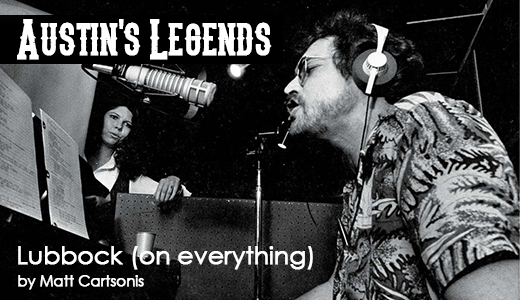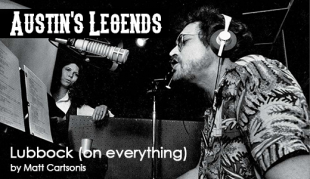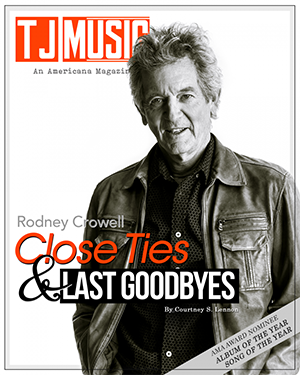Austin’s Legends: Lubbock (on everything)
by Matt Cartsonis, contributing writer
I first heard of Terry Allen via Joe Ely’s primordial internet bulletin board, “Campfire Nightmares” back in the early to mid ’80s. I was in the Hudson Valley attending college at the time, working my way through senior year. I helped run the audiovisual department. So, I had access to a “dial up, get the tone and drop the receiver into the cradle” 300 baud modem, which was the then-bleeding-edge portal to a just-hatching online world.
The bulletin boards featured areas dedicated to Ely’s recordings and tour schedule, as well as Humorous Band Names (“Pit Bulls on Crack” is still my favorite over 30 years later) and obscure Texas miscellanea along the lines of Ralph the Swimming Pig and his famous Swine Dive (look him up). In, these virtual hallways echoed the mysterious legend of “The Great Joe Bob.” It was an inside thing, apparently. No details were given. But another name kept coming up next to Joe Bob’s. Apparently a friend of Joe Ely’s: Terry Allen.
I graduated and returned home to Arizona. I would not see a modem again for another couple of years. But the enigma of Joe Bob endured, and guilty by association, so did Terry Allen’s name.
Then somebody lent me Lubbock (on everything). And the world changed.
It may come down to crops. As a semi-rural Arizonan, that’s how I relate to other places. My neighborhood was rich in the various “C’s” of Arizona’s economy: Copper, Cotton, Cattle, Citrus. But, mostly cotton. My best friend’s dad was a cotton farmer, and we spent our 120° summers wallowing in the icy farm pump water out on their land. People around there back then still had the accents they’d brought with them from Texas and places further east, that, in the earlier part of the century, were blown out by dust storms (we did not call them ‘haboobs’) and the still-alive promise of westward expansion.
Nothing can bring me back to where I grew up like the smell of cattle and cotton. Here in California, that stretch around Fresno and Visalia has it. So does Lubbock, TX. I’ve been to Lubbock a few times. I have played there from time to time, and at others have just driven through. I was once blasted four highway lanes of off the road by a tornado just outside the city proper. Each visit was underscored by a deep sense of nostalgia. There’s just something about those flatlands that remind me, deeply,of home. The cotton. The milo. The perfume of stockyards and cotton gins. The crazy weather. The dust. The “nowhere” of it. The inseparable combination of “here we are, where we grew up, and it’s the best place in the world.” And, at the same time “GET ME OUT OF HERE!” The Last Picture Show, minus Cybill Shepherd.
Lubbock (on everything), Terry Allen’s second album, was released in 1979. It took me about five years after that to hear it. We’ll call these the ‘lost years.’ I’d already, in a manner of speaking, managed to escape my hometown. But, as they say, you can run, but you can’t hide. I mean, I still crave a good cheese crisp. Weird stuff happens in the desert. And in the flatlands. And in your hometown. And if you live long enough with weird, with nobody to point out that it’s weird, it turns normal. And then, I guess, you die.
Lubbock (on everything), showed me that the weirdness I felt was there, really was. Just about every song on the album was the answer to questions I didn’t even know I had about a flat, hot, agricultural middle-of-nowhere where highway still defines growing up. And, high school just might represent the best years of your life. It is about those who left because it couldn’t hold them anymore, those who stayed because, well, because. A collection of songs sung in a down-home and personal way, about stuff you might not have even thought you were thinking about until you heard them.
My favorite tracks on the album, “High Plains Jamboree,” covers the beautifully, not-so-pretty two-stepping landscape any honky tonk picker sees on the dance floor any day of the week. “Lubbock Woman,” just might be about half of the couple from the previous tune. “Truckload of Art,”which, true or not, continues to be a great (you live in a) bubble-popper. “The Great Joe Bob (A Regional Tragedy),” about local greatness and darker stuff. “The Wolfman of Del Rio,” about awakenings and line-crossings, as it were. “The Girl Who Danced Oklahoma,” sketches a rural refugee’s small town to big city metamorphosis better than anything I’ve ever seen or heard.
I’m pretty sure I went to high school with The Great Joe Bob. I’ve seen “just another couple on a Highplains Jamboree” sucking down cocktails at Cecil’s Hideaway in my own hometown, where Loose Ruby Cole could easily have been hopping tables. Might as well have been listening to the Wolfman when outrunning the Avondale cops in my friend’s old Caddy that night two years before I got my license. I still see that fancy stitching on the blue jacket every time I hear “FFA.” I’m still friends with my era’s Maid of Cotton. In a way, Lubbock (on everything) is the yearbook of my life.
In the mid ’90s I had to leave my apartment in Santa Monica for a while after the Northridge earthquake messed it up. Serendipity led me to Austin, Texas, where I played bass with the Austin Lounge Lizards. The fiddle player at that time was Richard Bowden, a longtime member of the general Terry Allen crew, and who plays all over Lubbock (on everything). Some of my favorite memories of that time involve driving with Richard on the way to some remote gig, howling “The Great Joe Bob” in very loud voice. In harmony. As everybody should.
Friends sometimes ask me what I’m listening to, or what music I might recommend they give a try. I don’t care who they are, or what they’re into. My first response is “Lubbock (on everything).” Because it’s genuine truth. Truth that you don’t get much of these days, along with great music, written the way I wish I could write, underscoring what the Nobel Committee has defined as literature, sung by somebody who sees it, knows it and means it. I’ve recommended Lubbock (on everything) to more people than I can count, and I know which of them have taken my advice, because they always come back with their heads exploded, just like mine was. Messy, but happy.
I haven’t been to Lubbock for a long time now. I’m guessing it has stayed at least a little more the same than my home town, which, like so many others, has been swallowed up by the (not-so-much) greater Phoenix metropolis. But as long as I have Lubbock (on everything), the world I grew up in remains tangibly accessible.
I could go on for a long time talking about this record. But why? If you’ve really heard it, you already know. If you don’t, well, do it. I mean, really listen to it. It will improve your life, and you’ll likely learn something about yourself, the crackpots who surround you, and thus, art and humanity in general.
Did I mention that I freaking love this album? Thanks, Terry Allen.
And for those who haven’t heard Lubbock (on everything), do yourself a favor. Now.
Post Script: I’m writing this in place of Gary Austin, songwriter and founder of the Groundling Theatre of Los Angeles, who originated this column and who left us on April 1, 2017. I introduced Gary to Terry Allen’s music. And then to Terry himself a couple of years later. I was playing one of our favorite tunes from Lubbock (on everything) “The Beautiful Waitress” at Gary’s bedside as he drew his last breath. I know he would have loved to have been here for Terry Allen Week.
Matt Cartsonis
Latest posts by Matt Cartsonis (see all)
- Austin’s Legends: Lubbock (on everything) - June 15, 2017




